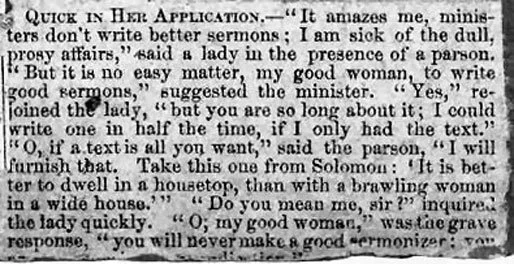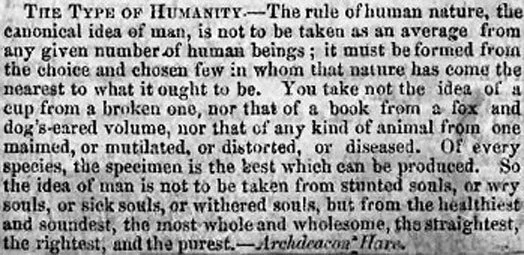MINISTERIAL HIT.
A renowned clergyman not a thousand miles from this city, lately preached rather a long sermon from the text, “Thou art weighed and found wanting.” After the congregation had listened about an hour, some began to get weary and went out; others soon followed, greatly to the annoyance of the minister. Another person started, whereupon the parson stopped in his sermon and said, “That is right, gentlemen; as fast as you are weighed pass out!” He continued his sermon at some length after that, but no one disturbed him by leaving.
A BEAUTIFUL CONCEIT.
– Some author informs us how we became indebted for the red rose. They were all of a pure and spotless white when in Eden they first spread out their leaves to the morning sunlight of creation. Eve, as she gazed on the tintless gem, could not suppress her admiration of its beauty, but stooped down and imprinted a warm kiss on its snowy bosom. The rose stole the scarlet tinge from her velvet lip, and yet wears it.
A RUSTIC ROLAND FOR AN OLIVER.
It is related of a Scotch clergyman, who is more indebted to his manuscript than to his memory, that he called unceremoniously at a cottage, while its possessor was engaged in perusing a paragraph of the writings of an inspired prophet.
“Weel, John, what’s this you are about?” “I am prophesying.” “Prophesying! I doubt you are only reading a prophecy?” “Weel,” argued the rustic, “gin reading a preachin’ be preachin’, is no reading a prophecy prophesying?”
Last part of above newspaper article translated from Scottish to English: -
“Well, John, what’s this you are about?” “I am prophesying.” “Prophesying! I doubt you are only reading a prophecy?” “Well,” argued the rustic, “If reading a preaching be preaching, is not reading a prophecy prophesying?”
HAVE FAITH.
Of all the principles that actuate and govern a man’s life, none has a more important influence than faith. He must recognize his nature as adapted to a nobler purpose and end, and in the pursuit of that purpose, firm faith in his mission and ability to accomplish it, is his surest and mightiest inspiration. The finest genius and the best talent, are to no purpose without the guidance of faith to some definite end. The men who have worked revolutions in the world, have been men of profound faith – either in God, or in the work to which, under God, they put their hands. Faith has nerved the arm of the hero and the heart of the martyr.
JOSH BILLINGS ON PREACHING.
– “I always advise short sermons, especially on a hot Sunday. If a minister kant strike ile in boreing forty minutes he has either got a poor gimblet, or else he is a boreing in the rong place.”
MY MOTHER DON’T.
– “Eddie, do you ever forget to say your prayers before you go to bed?” asked little Bertie.
“Prayers! I never say my prayers,” answered Eddie. “I don’t know any.”
“Oh,” continued Bertie, “ I have said mine ever since I can remember. My mother teaches me.”
“Well,” said Eddie, “mine don’t.”
In a few minutes he added,
“What do you say when you pray?”
“Come with me in our yard, and I’ll tell you,” said Bertie.
Here the two children disappeared from view. How my heart ached for the bright-eyed boy whose mother was so forgetful of the immortal trust given her! I thanked God for giving his little playmate the will to labour in the vineyard of the Lord thus early.
QUICK IN HER APPLICATION.
– “It amazes me, ministers don’t write better sermons; I am sick of the dull, prosy affairs,” said a lady in the presence of a parson.
“But it is no easy matter, my good woman, to write good sermons,” suggested the minister.”
“Yes,” re-joined the lady, “but you are so long about it; I could write one in half the time, if I only had the text.”
“O, if a text is all you want,” said the parson, “I will furnish that. Take this one from Solomon: ‘It is better to dwell in a housetop, than with a brawling woman in a wide house.’”
“Do you mean me, sir?” inquired the lady quickly.
“O; my good woman,” was the grave response, “you will never make a good sermonizer: you…..
THE ANTIQUITY OF LADIES’ HOOPS.
– Our readers will find, by turning to the third chapter of the book of Isaiah, and reading the 18th verse, that not only were hoops worn in those days by the daughter Zion, but they were also an abomination in the sight of the Lord. To save them the trouble, however, of hunting it up, here is the verse: -
“In that day the Lord will take away the bravery of their tinkling ornaments about their feet, and their cauls, and their round tiers like the moon.”
THE SOUL
The Soul, considered abstractedly from its passions is of a remiss and sedentary nature, slow in its resolves, and languishing in its executions. The use, therefore, of the passions, is to stir it up, and to put it upon action, and awaken the understanding, to enforce the will, and to make the whole man more vigorous and attentive in the prosecution of his designs.
THE TYPE OF HUMANITY.
– The rule of human nature, the canonical idea of man, is not to be taken as an average from any given number of human beings; it must be formed from the choice and chosen few in whom that nature has come the nearest to what it ought to be. You take not the idea of a cup from a broken one, not that of a book from a fox and dog’s-eared volume, nor that of any kind of animal from one maimed, or mutilated, or distorted, or diseased. Of every species, the specimen is the best which can be produced. So the idea of man is not to be taken from stunted souls, or wry souls, or sick souls, or withered souls, but from the healthiest and soundest, the most whole and wholesome, the straightest, the rightest, and the purest. –
Archdeacon Hare*.
*In 1840 Julius Charles Hare was appointed Archdeacon of Lewes.
THE VANITY OF DRESS.
– The popular preachers in Paris have entered upon a crusade against the lavish expenditure of their lady hearers upon dress, the waste of material especially exciting their indignation. One of them, a bishop, exclaimed in the height of his zeal, in the midst of a late discourse,
“Let women remember while putting on their profuse and expensive attire, how narrow are the gates of Paradise.”
CONDEMNING PASSAGES.
(Jno, iii. 20.21; Heb. iv. 12; 2 Tim iii. 16; Eph. V. 13, 14.)
Christian! Are there no special portions of God’s Word – no particular parts, passage, or texts – which your eye involuntarily turns FROM, when it falls upon them?
If so, look to yourself; it shews there is a screw loose in your religion; something in your faith or practice which will not bear the light at God’s Word. Look the condemning passages calmly in the face, and examine your own heart by them well. There is safety in no other cause.
Tonbridge
Lord’s Day Afternoon
One Lord’s day afternoon, the late Mr. Fuller of Kettering, perceiving some of his hearers to be drowsy, as soon as he had read his text, struck the Bible three times against the side of the pulpit, calling out,
“What! Asleep already? I am often afraid I should preach you asleep, but the fault cannot be mine to-day, for I have not yet begun!”
LAST HOURS.
Let us remember, that when we shall come to die, and our souls sit, as it were, hovering upon our lips, ready to take their flight, at how great a rate we would then be willing to purchase some of those hours we once trifled away.
HOW TO HEAR THE GOSPEL.
– Rowland Hill paid a visit to an old friend a few years before his death, who said to him,
“Mr. Hill, it is just 65 years since I first heard you preach, and I remember your text and part of your sermon. You told us that some people were very squeamish about the delivery of different ministers who preached the same gospel.
You said, ‘Suppose you were attending to hear a will read, where you expected a legacy left you, would you employ the time in criticising the manner in which the lawyer read it? No, you would not; you would be giving all your ear to hear if anything was left to you, and how much it was. That is the way I would advise you to hear the gospel.’” Good advice, well worth remembering sixty-five years!









